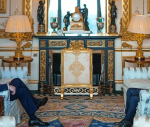You are here
Obama — ‘pitch perfect’
Feb 23,2015 - Last updated at Feb 23,2015
I must admit that I was somewhat sceptical as I approached this week’s “White House Summit on Countering Violent Extremism” (CVE).
I was concerned that it might end up being nothing more than a “box-checking” exercise. I was troubled that it might be perceived as targeting American Muslims and fostering a sense of increased alienation for some, while at the same time feeding the sense of suspicion that could result in a spike in hate crimes against Muslims.
I was also wary of the fact that “CVE” had become a hustle for some social entrepreneurs set to spawn a “cottage industry” as potentially lucrative and as utterly misdirected, useless and counterproductive as the enterprise created by the so-called “terrorism experts” of a generation ago.
Nevertheless, I went and I participated.
There were, to be sure, a few “hustlers” in attendance and there were a few sessions that felt like “box-checking”.
And then there were some Muslims who protested the event, convinced that any discussion of Muslims would contribute to more discrimination against their community.
This, however, was not what defined the summit for me, because what I also found at the White House were some remarkable people who were doing some extraordinary things in communities around the US.
I had been asked to chair one of the summit’s sessions and marvelled at the conversation that ensued.
The room was full of good people — political, business, faith and community leaders from across the US, Europe and Africa — all making a determined effort to build bridges and promote understanding.
As we found so many times before, while current challenges may have brought out the worst in some, they also created the opportunity to bring good people together to support each other.
What ultimately made the day work was the closing address by President Barack Obama.
Playing multiple roles — teacher, analyst, sympathetic parent and inspirational leader — his remarks were “pitch perfect”.
With the US leading a broad coalition of countries that has been militarily targeting Daesh, the president was keen to lay out a strategy to take on the ideology Daesh uses to recruit disaffected, alienated youth.
Challenging and defeating Daesh will, the president noted, involve more than the coalition’s military might. It will require challenging their ideology and dismantling their recruitment infrastructure. And that was his focus.
The extremists’ ideology must be discredited. The economic and political grievances exploited by the terrorists must be addressed. And partnerships must be developed with Muslim communities so that they can be empowered to challenge the false and dangerous goals posed by extremists.
The president was making clear that it is disaffection, anger or alienation that makes young people susceptible to the ideas of extremists. But while the purveyors of violence can prey off of discontent, they have nothing real to offer. This must be made clear before recruits are seduced and drawn into the extremists’ web. To do this will take the concerted action of communities working together.
The president continued his tough rhetoric against Daesh and was forceful in his resolve that they be defeated. But he was also clear that in targeting Daesh and other forms of violent extremist ideology, the US and the West, in general, were not at war with Islam, since this is exactly how Daesh and Al Qaeda want to frame the conflict.
He said: “They are desperate for legitimacy. They try to portray themselves as religious leaders — holy warriors in defence of Islam... and they propagate the notion that America is at war with Islam. That’s how they recruit... [but] it is a lie.... They are not religious leaders — they’re terrorists. And we are not at war with Islam.”
Not surprisingly, it was on this last point that the president’s critics pounced.
For days now, Republicans and several media analysts, instead of focusing on what the president did say, have been relentless in attacking him for what he did not say.
Apparently, what they wanted the president to say was that this was, in fact, a war against “Islamic terror” or “radical Islam”.
Said one critic: “You can’t win this war if you can’t name the enemy.”
Senator John McCain responded to Obama by accusing him of propagating “a big lie”.
The most strident attack came from former mayor of New York City, Rudy Giuliani, who said: “You’ve got to be able to criticise Islam for the parts of Islam that are wrong... what’s wrong with this man that he can’t stand up and say there’s a part of Islam that’s sick?”
Answering his own question, Giuliani added that the problem with “this man” is that “[he] doesn’t love America... [because] he wasn’t brought up... through love of this country”.
Not only was their criticism disgraceful and insulting, Giuliani and McCain were also dead wrong.
The president’s message has been tough enough and smart enough. He has built a coalition that has mobilised most of the Muslim world, involving them as partners in the fight against violent extremism.
The president has chosen a path designed to isolate and ultimately destroy what he referred to as a “death cult”. That is smart and tough.
On the other hand, if McCain and Giuliani had their way, we would be digging ourselves deeper into the holes dug by the Bush administration. We would be in the midst of a “clash of civilisations”. And Sarah Palin would be a heartbeat away from the Oval Office.
That is neither smart, nor tough. It is just plain reckless.













